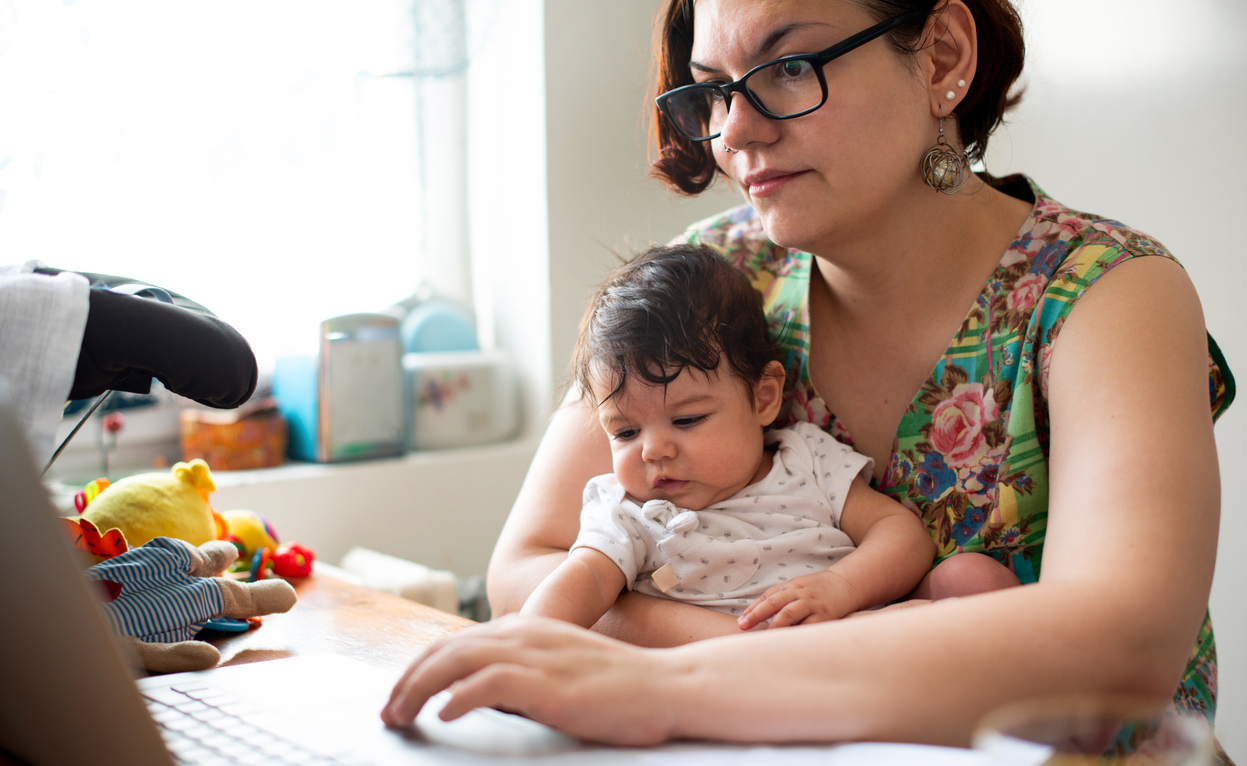
Working moms deserve a new New Deal
Editor’s note: The following op-ed, which originally appeared in Medium and is crossposted with permission, is co-authored by Esta Soler and Rebecca Dixon. Soler is Founder and President of Futures Without Violence, Dixon is Executive Director of the National Employment Law Project.
By Esta Soler and Rebecca Dixon
The United States currently faces an economic crisis of climactic proportions. Working families who were already teetering on the brink of financial insolvency now face mass unemployment and a deeply uncertain future. In an economy in which women make up nearly two in three workers in low paid jobs — nearly half of whom are women of color — the burden of this economic collapse will fall disproportionately along gendered and racial lines.
The COVID-19 pandemic has laid bare the lack of protections for working people writ large. As the national spotlight shines on the millions of workers grappling with a threadbare social safety net and low wage “essential” workers facing risks to their personal health and safety, more people can finally see the harsh reality too many marginalized women and families face every day.
This crisis has forced us all to reckon with a flawed healthcare system in which medical care is contingent on one’s job, sowing the seeds for disaster when mass unemployment events occur. In this and other respects, government cannot sit on the sidelines. Our elected officials and policymakers need to mandate that workplaces provide necessary support for working families in the form of paid leave, a livable wage, and childcare, and that the government work with small businesses to supplement those added costs.

Working mom deserves better.
To emerge from this crisis a stronger nation with a stronger economy, we have to stand in the shoes of the most vulnerable. We need a new New Deal that does not leave out domestic workers and farmworkers like the first one did, but rather sets workers up for stability both during this crisis and in the recovery to follow — a stable floor so that workers don’t fall through the cracks.
This starts with four things:
1. Increasing the minimum wage everywhere to at least $15 an hour;
2. Providing guaranteed paid sick and family leave to every worker;
3. Extending access to unemployment insurance to help women fleeing violence at home; and
4. Ensuring every person gets the medical care they need without regard to cost or employment status.
These protections will both empower women facing crisis and provide greater stability to families overall. There is a clear nexus between poverty and domestic violence, and the poorest Americans are 12 times more likely to experience sexual assault. Poverty limits opportunities to escape, heal, and secure independence. With government-mandated protections in place to guarantee paid leave, access to healthcare, and a living wage, we can ensure the most vulnerable in our society are able to escape from the structural binds of poverty and thrive.
The current absence of these protections is what’s driving the disparities that women — particularly women of color — face. In the midst of this historic public health and economic crisis, longstanding injustices, like vast inequality, have created a chasm that we clearly can no longer bridge. March 31, 2020 was Equal Pay Day, which underscored how women still make a mere 81 cents for every dollar a man earns. For Black women, that number is a dismal 62 cents on the dollar, and for Latinx women even lower, at 54 cents. In spite of this, when it comes to dismantling injustices in U.S. society, women of color continue to lead.
More than any other crisis in recent memory, women working in low wage jobs are at the center of the storm. As the National Women’s Law Center recently noted, the pay gap only begins to tell a story — one that becomes even more distressing when you dig into the details of which jobs have been most affected by the pandemic. Women make up 93 percent of child care workers, 66 percent of grocery store cashiers, and 70 percent of servers at restaurants. A majority of housekeeping and home healthcare positions are held by women, a disproportionate number of whom are women of color. For the Black single mother working one of these positions, the impacts of this crisis will be particularly brutal.
Of course, few of these low wage positions come with essential benefits like health insurance, childcare, and paid leave — benefits that are needed now more than ever. While the passage of the $2 trillion CARES Act may have served as a necessary lifeline to some workers, it was woefully insufficient at addressing these longstanding, fundamental inequities that plague our economy. President Roosevelt saw the Great Depression as an opportunity to address the deep economic injustices taking root in the United States, but the New Deal was “race silent,” with a glaring exemption of 90 percent of Black women from its reforms and benefits. If we want to emerge from this crisis with a stronger economy that puts people above profit, lawmakers today must go beyond this old deal and seize the chance to remove the institutional, structural, and systemic barriers to accessing health, safety, and prosperity.

The New Deal provided significant reforms, but a new New Deal must go farther. Beyond a shadow of a doubt, this pandemic has demonstrated that our economy is only as strong as the systems that support the most vulnerable workers. Many underpaid workers carry out labor that is truly essential at all times — farmworkers who harvest the food we eat, domestic workers who care for children and the sick and elderly, janitors who clean our hospitals. Their health and wellbeing is interdependent with everyone else’s. The women who make up an outsized share of these positions are on the frontlines right now protecting and caring for the rest of us. This should not happen at the expense of their health and wellbeing and that of their families. Now it’s time for Congress to step up and protect them.
This means a new New Deal, one that includes a living wage, paid sick and family leave, comprehensive access to unemployment insurance, and access to healthcare for everyone — ensuring that Black, indigenous, and all people of color, including immigrants, are included this time. If we do right by our most at-risk yet most essential workers, a better world awaits us on the other side.

